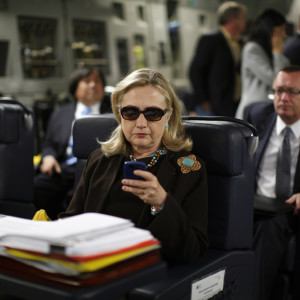Given 100 guesses as the year began on how Hillary Clinton might transform her second presidential campaign from coronation into catastrophe, a furtive home-brew email network would not have been one of them. The shadowy operation is unsettling on its own. The former secretary of state put herself in the center of a deadly minefield each time she used her secret email account to conduct official business.
Clinton’s risible claim to have been “dead broke” when she and Bill Clinton left the White House in 2001 and her unseemly fees for brief appearances on college campuses all seem like quiet overtures to the email disaster that continues to engulf the embattled Democratic frontrunner.
This is one of the rare Hillary Clinton controversies that has nothing to do with her preoccupation with making a fast buck. The exploding email scandal goes to a different theme in the nation’s quarter-century drama with the Clintons. This is the more pernicious one that arises out of Mrs. Clinton’s profound mistrust of the public. That’s right, you and me.
In 1993, Clinton damaged her health care takeover proposal from the start by insisting that it operate in secrecy. She has never believed that sunshine is the best disinfectant, the street the best cop. When Clinton became secretary of state in 2009, she doubled down on deception and established an email network for herself and her closest aides that was housed, she says, in her Chappaqua, N.Y., estate.
The sensitive nature of some of those emails is at the center of this Clinton crisis. The nation’s former top diplomat looks to have been reckless in what she received and sent on her Chappaqua server. Clinton decided at the start of her tenure as secretary of state that the public and press using the Freedom of Information Act to read some of her messages was a greater risk than the harm she might do to the nation with an amateur email setup at home.
She gambled that the public would not discover her deception. Then she doubled down on explaining the arrangement away as a matter of convenience. Carrying two email devices would have been too cumbersome. She made broad claims — reckless, in retrospect — in the spring that the messages were mostly personal, touching on yoga, family wedding plans and her mother’s funeral. Clinton will never be typecast as gentle and domestic, so that fell flat.
Her favorite villain, the vast right-wing conspiracy of yesteryear, enjoyed a brief revival until nonpartisan national security officials began a searching investigation into Clinton’s email practices and appear to have found some messages that ought not to have been on the server. The public may not know the difference between top secret, classified and sensitive, but it understands Clinton had to have known she was disregarding the national interest when she launched that server.
The public, as it often is, understands the gravity of the latest emerging Clinton scandal better than much of our political class. Voters are turning on Clinton at a time when she and her galleon of a campaign organization thought she’d be embraced by the multitudes. Even if Clinton knew how to deliver a joke, her server crisis would prove resistant to a dismissive funny line.
Her thin bench of defenders has failed in claiming that Clinton’s two predecessors did the same thing. They did not. Condoleezza Rice did not use email. Colin Powell had no private server.
Politicians and activists can be a cynical lot. They are probably not much troubled by Clinton’s email arrangements. Polls, however, showing the public’s mistrust of the New York fabulist have alarmed professional Democrats. Great swaths of voters, who may quarrel over many issues, are reaching a consensus that Clinton is neither honest nor trustworthy.
This hour of danger for Clinton’s presidential prospects revealed itself last week in astounding polls from two reliably Democratic states, Pennsylvania and Michigan. She loses both to Republican Marco Rubio, and not in squeakers. Even the nation’s new vulgarian in chief, Donald Trump, makes a competitive contest of it with Clinton.
You can lose sensitive emails to foreign hackers. You can make the slippery truth a moving target. But you had better not lose Pennsylvania and Michigan.

